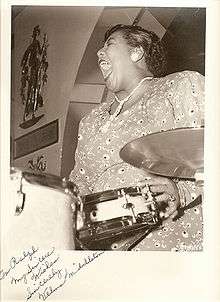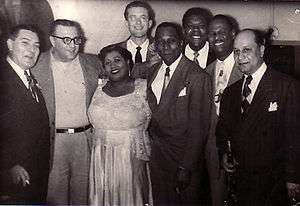Velma Middleton
Velma Middleton (September 1, 1917 – February 10, 1961)[1] was an American jazz vocalist and entertainer who sang with Louis Armstrong's big bands and small groups from 1942 until her death.
Velma Middleton | |
|---|---|
 Photo by Ralph F. Seghers | |
| Background information | |
| Birth name | Velma Middleton |
| Born | September 1, 1917 Holdenville, Oklahoma, U.S. |
| Died | February 10, 1961 (aged 43) Freetown, Sierra Leone |
| Genres | Jazz |
| Occupation(s) | Singer |
| Years active | 1930s–1961 |
| Associated acts | Louis Armstrong |
Biography

Middleton was born in Holdenville, Oklahoma,[1] and moved with her parents to St. Louis, Missouri. She started her career as a chorus girl and dancer and throughout her career performed acrobatic splits on stage.[2][3] After working as a solo performer, and singing with Connie McLean and his Rhythm Orchestra on a tour of South America, she joined Armstrong's big band in 1942, and appeared with him in soundies.[4]
When Armstrong's orchestra disbanded in 1947, Middleton joined his All-Stars, a smaller group. She was often used for comic relief, such as for duets with Armstrong on "That's My Desire" and "Baby, It's Cold Outside", and she did occasional features. She also recorded eight tracks as a solo singer for Dootone Records in 1948 and 1951. Although she was not widely praised for her voice, described by critic Scott Yanow as "average but reasonably pleasing and good-humored",[4] Armstrong regarded her as an important and integral part of his show.[4]
Middleton performed on June 7, 1953 with Louis Armstrong and his All Stars for the famed ninth Cavalcade of Jazz concert held at Wrigley Field in Los Angeles which was produced by Leon Hefflin, Sr. Also featured that day were Don Tosti and His Mexican Jazzmen, Roy Brown and his Orchestra, Shorty Rogers, Earl Bostic, and Nat "King" Cole.[5]
While touring with Armstrong in Sierra Leone, she had a stroke in January 1961,[6] and died the following month in hospital in Freetown.[1] Musician Barney Bigard was critical of Armstrong and his manager Joe Glaser for refusing, after Middleton was taken ill, to arrange her transfer to a country with better health facilities.[7]
References
- Eagle, Bob; LeBlanc, Eric S. (2013). Blues - A Regional Experience. Santa Barbara: Praeger Publishers. p. 342. ISBN 978-0313344237.
- Forbes, Mike (2015). Louis Armstrong's all stars : the last great era of his life in music. Surrey: J Michael Forbes. ISBN 9781326375812. OCLC 987159252.
- Lullaby of Harlem. Directed by Pat Britt, Spike Harrigan, Louis Jordan, Dizzy Gillespie, Count Basie, Billie Holiday, Louis Armstrong, Velma Middleton, George Washington, Cab Calloway, Fats Waller, Duke Ellington, Billy Eckstine, Passport Video, Delta Rhythm Boys, Tympany Five, Mills Brothers, and King Cole Trio. Passport Video, 2004. DVD.
- Yanow, Scott. Biography of Velma Middleton, AllMusic.com. Retrieved 15 November 2016
- “Jazz Cavalcade will be greatest Sunday, June 7th” The California Eagle May 21, 1953.
- Spencer, Frederick J. (2002). Jazz and death : medical profiles of jazz greats. Jackson: University Press of Mississippi. ISBN 9781604736335. OCLC 773827397.
- Spencer, Frederick J. (2002). Jazz and Death: Medical Profiles of Jazz Greats. Univ. Press of Mississippi. pp. 47–. ISBN 978-1-60473-633-5. Retrieved 4 September 2019.
Further reading
- Forbes, Mike. Louis Armstrong's All Stars. Surrey: J Michael Forbes, 2015.